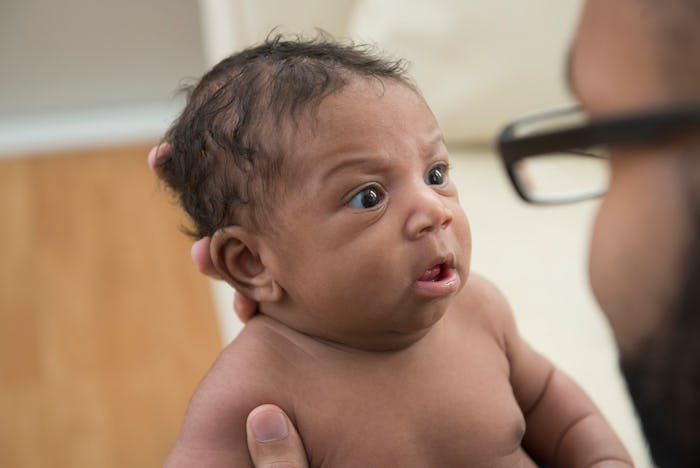Life

5 Symptoms Of Vitamin D Deficiency In Baby That New Moms Should Watch For
As a mom, you go above and beyond to make sure your baby is as healthy as possible. But your child could still be missing out on some key nutrients — vitamin D in particular. That's why you need to know the symptoms of vitamin D deficiency in babies.
“Vitamin D is critical for calcium metabolism, playing a key role in bone and tooth development,” David Hill M.D., pediatrician, author, and spokesperson for the American Academy of Pediatrics (AAP), tells Romper. "We’ve learned that Vitamin D also contributes to healthy immune function and may help prevent diabetes," he adds. That's why the AAP recommends 400 IUs of Vitamin D per day for children in their first year of life. But as WebMD reported, only 5 to 13 % of breastfed infants and 20 to 37 % of formula-fed babies receive the recommended amount of vitamin D, according to the Centers for Disease Control and Prevention (CDC).
While breastmilk is full of beneficial nutrients, vitamin D is the only thing missing, says Dr. Hill, which is why “nursing infants should take a daily Vitamin D supplement.” If your baby is formula-fed, Dr. Hill says they likely won’t need a supplement because infant formula includes vitamin D at the appropriate concentrations.
As your baby gets older, you will be able to provide foods that are rich in vitamin D such as eggs, milk, and certain types of fish. Because the sun is such a critical source of vitamin D, it's important to provide your baby with a supplement during the winter months, according to Science Daily. If you're worried that your baby has a vitamin D deficiency based on symptoms like the following, talk to your doctor about ways you can balance their diet and prevent long-term development issues.
1Rickets
“More severe vitamin D deficiency is called ‘rickets,’ and it occurs most often between 3 and 18 months of age,” says Dr. Hill. Infants with an extreme vitamin D deficiency can develop this condition, which causes soft, weak bones that can become curved, according to the Vitamin D Council. In fact, Dr. Hill explains, “Low vitamin D levels can even lead to seizures as calcium levels in the bloodstream fall dangerously [and] fractures can be a risk from weakened bones.”
2Tooth Delay
While no parent enjoys the dreaded teething stage, it’s a necessary part of your child’s development. Unfortunately, inadequate amounts of vitamin D can have an impact your child's teething schedule. Research from the American Journal of Orthodontics and Dentofacial Orthopedics found that a vitamin D deficiency can result in delayed tooth development.
3Poor Growth
Children with a vitamin D deficiency can experience severely stunted growth, according to the AAP. Because vitamin D is so important to bone development, if your baby isn't getting enough of the essential nutrient, it's likely that the growth of their bones will be negatively impacted.
4Respiratory Issues
Most babies will experience bouts of colds and flu during the winter months, but a lack of vitamin D will put your baby at risk for longer and more serious respiratory issues. As the Vitamin D Council mentioned, people who have low levels of vitamin D are more prone to developing respiratory infections.
5Irritability
If you have a very fussy baby and can’t seem to determine the root cause of it, a lack of vitamin D may be to blame. According to the American Academy of Family Physicians, while less obvious, irritability is one of the symptoms that is often associated with a vitamin D deficiency in a baby.
Experts:
David Hill M.D., pediatrician, author, and spokesperson for the American Academy of Pediatrics
This article was originally published on